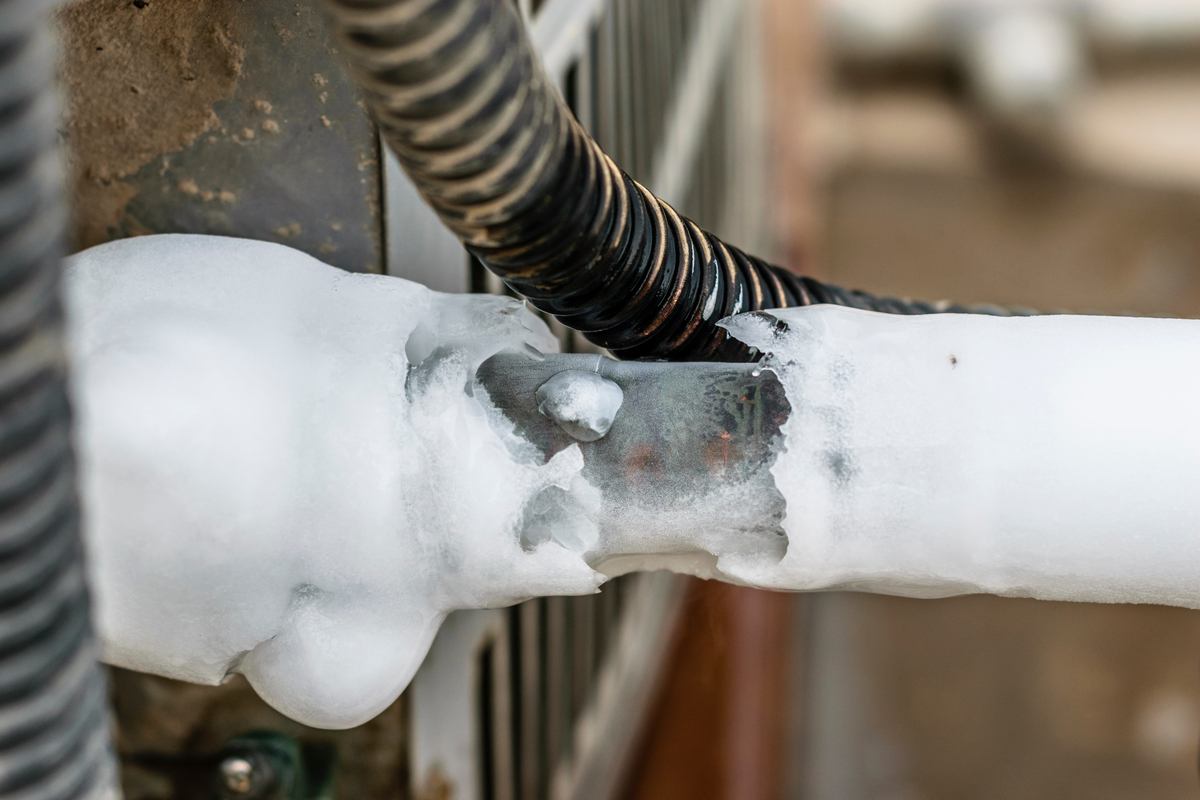Why Your AC Suction Line Freezes and How to Prevent It
When Calgary homeowners see frost or ice on their air conditioner’s copper tubing, it’s often the suction line that’s affected. A frozen AC suction line is more than an inconvenience; it’s a sign your cooling system isn’t working properly and could lead to larger issues like compressor failure.
In this article, we’ll explain what the suction line does, why it freezes, and how to prevent it with the right maintenance and repairs.
Understanding Your AC’s Copper Lines
Your AC system has two copper lines that connect the indoor and outdoor units:
- Liquid line: Carries refrigerant in liquid form from the outdoor condenser to the indoor evaporator coil.
- Suction line: Returns refrigerant vapor from the indoor coil back to the compressor. This line is insulated and larger in diameter, often called the “return line.”
When you notice ice forming on this tubing, the refrigerant inside is dropping below freezing, something that shouldn’t happen in a properly operating system.
Main Reasons Your Suction Line Freezes
Several frozen suction line causes are common for Calgary homeowners:
1. Airflow Problems
Restricted airflow prevents warm indoor air from circulating across the evaporator coil. Without enough heat exchange, the refrigerant stays too cold, and frost builds up. Causes include:
- Dirty or clogged air filters
- Blocked or closed vents
- Dust buildup on the evaporator coil
- Blower motor issues
2. Low Refrigerant Levels
A refrigerant leak can lower the system’s pressure and temperature. Low refrigerant is one of the most frequent reasons for an HVAC suction line freezing. If you suspect an AC refrigerant leak in Calgary, professional repair is essential.
3. Low Indoor Temperatures
Running your AC when the thermostat is already set too low (for example, below 18°C/65°F) can cause the coil and suction line to ice up. This is particularly common in shoulder seasons when outdoor temperatures dip at night.
Signs Your AC Suction Line Is Freezing
You may notice:
- Visible ice or frost on the suction line or outdoor unit
- Reduced airflow from vents
- Warm air blowing when the system is running
- Unusual hissing or bubbling noises (a sign of a refrigerant leak)
- Higher energy bills without improved comfort
If you notice these, your system may already need frozen AC coil repair in Calgary.
How Refrigerant Type Affects Freezing Risk
Different refrigerants (like R-22 or R-410A) respond differently to pressure and temperature changes. While both can freeze under the wrong conditions, older systems using R-22 may be more prone to freezing if refrigerant is low, especially since this type is being phased out. If your AC still runs on R-22 and struggles with recurring freezing, it may be worth considering a new AC unit in Calgary for better efficiency and reliability.
Impact of a Frozen Suction Line on Your System
Letting your AC run while the suction line is frozen can cause:
- Compressor damage (often the most expensive repair)
- Worsening refrigerant leaks
- Shortened system lifespan
- Reduced indoor comfort and air quality
This is why addressing a frozen air conditioner fix quickly is so important.
What to Do if Your Suction Line Is Frozen
- Turn off the system immediately. Running it frozen risks damaging the compressor.
- Let the ice thaw. Use the system’s fan-only mode to circulate air and speed up melting.
- Check the air filter. Replace it if dirty.
- Look for blockages. Ensure vents and returns are unobstructed.
- Call a professional. If ice returns or airflow is still weak, it’s time for expert service.
For safe diagnosis, schedule AC repair with a trusted ClearView technician.
How to Prevent Suction Line Freezing
The best prevention is regular care and maintenance:
- Replace air filters every one to three months.
- Schedule annual HVAC maintenance. Professional cleaning and inspection reduce the risk of both freezing and breakdowns.
- Keep vents clear. Avoid blocking airflow with furniture or rugs.
- Address refrigerant leaks promptly. Small leaks can quickly escalate into major issues.
- Set smart thermostat limits. Avoid running the system at very low settings during cooler evenings.
Routine AC maintenance in Calgary can identify small issues before they cause freezing or damage.
Professional Help for Suction Line Issues in Calgary
If your AC suction line is frozen, the ClearView Services team is here to help. We’ve served Calgary homeowners for years with reliable HVAC maintenance, repairs, and installations. Whether you need fast AC repair, leak detection, or a consultation about upgrading to a new AC unit, our licensed technicians provide solutions that restore comfort quickly.
Frequently Asked Questions About Suction Line Freezing
What is a suction line in my AC system?
The suction line is the larger, insulated copper pipe that carries refrigerant vapor from the indoor coil back to the outdoor compressor.
Is it safe to run my AC if the suction line is frozen?
No. Running your AC with a frozen suction line can damage the compressor and worsen the problem. Turn off the system and call for professional service.
Can I fix a frozen suction line myself?
You can take a few basic steps at home, such as replacing dirty air filters, checking that supply and return vents are open, and letting the ice thaw naturally. Running the fan-only setting can also help melt the buildup faster. However, if the suction line continues to freeze or you suspect a refrigerant leak, it’s important to call a licensed technician. Professional diagnosis ensures the root cause is corrected and prevents costly damage to your AC system.
How long does it take for a frozen suction line to thaw?
The thawing process can take several hours, depending on how much ice has accumulated and the indoor temperature. Turning off the cooling mode and running the fan helps circulate warm air and speeds things up. In some cases, it may take an entire day for heavy ice buildup to fully melt. Once thawed, the system should be inspected to determine why it froze in the first place, otherwise the problem is likely to return.
How often should I get HVAC maintenance to prevent freezing?
Annual HVAC maintenance is recommended for Calgary homeowners to prevent suction line freezing and keep your system efficient year-round.






